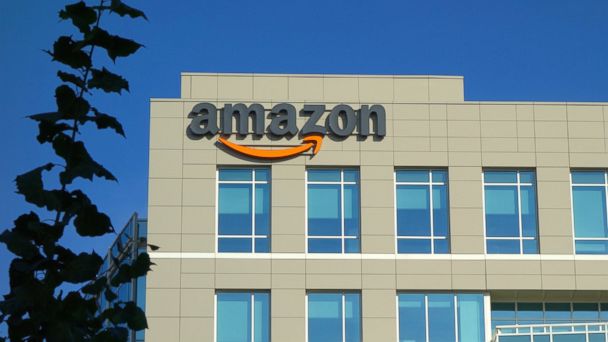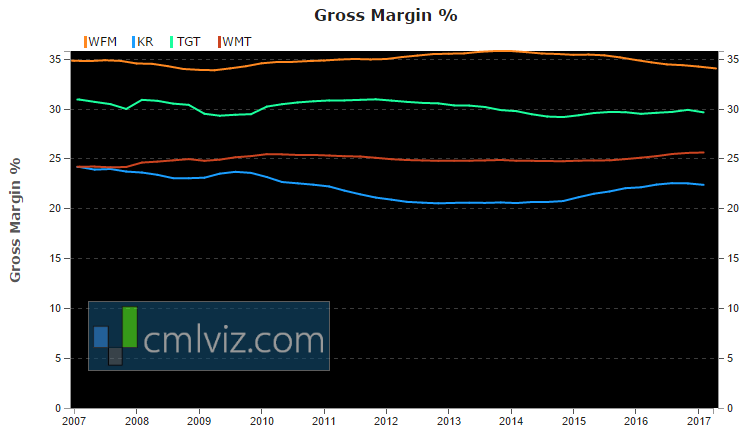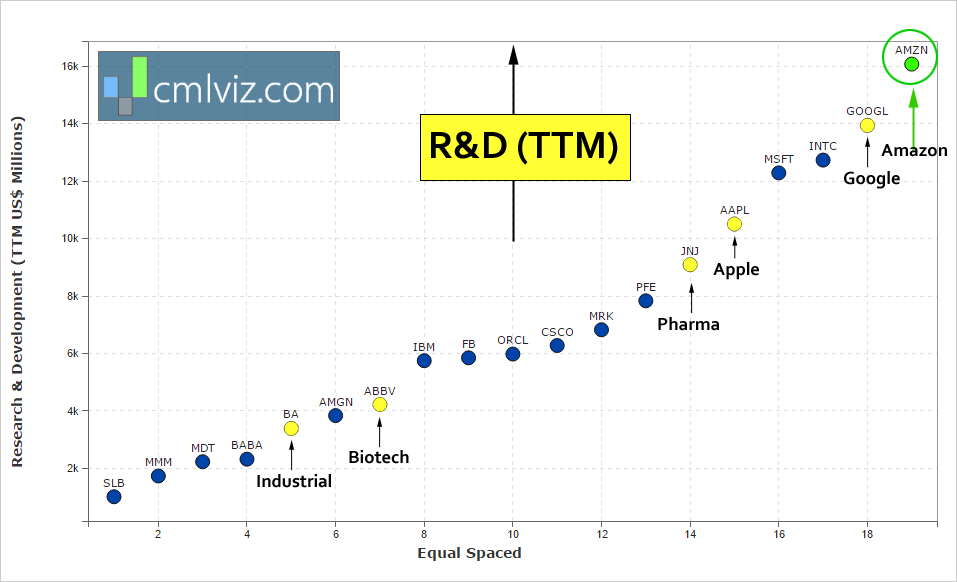Amazon.com Inc Creates Huge Risk with Whole Foods Market Inc Grocery Acquisition

Date Published: 2017-06-16
Written by Ophir Gottlieb
LEDE
Amazon.com Inc (NASDAQ:AMZN) has bid to purchase Whole Foods Market Inc (NASDAQ:WFM) for $13.7 billion. While Wall Street is celebrating the move, pushing Amazon.com stock up $23.54 (2.44%), there is one risk that Wall Street is missing -- and it's enormous.
WHY GROCERY
Amazon.com has agreed to purchase Whole Foods Market Inc and there are a lot of reasons this move makes sense. We start with, why grocery?
Size
According to Statista total retail and food service sales in the United States amounted to about 5.32 trillion U.S. dollars in 2015. Just grocery comes in at about $800 billion a year.
Perfect Business
Grocery is one of those business segments that Jeff Bezos has always been in love with, which is to say, it's a business that will continue forever. We will always need food, and we will likely not be growing it ourselves. The grocery segment strikes the right note with Bezos, who famously looks for things that will not change, to determine future moves rather than things that will change.
Even further, grocery is oft times referred to as the holy grail of retail in that it is a repeat purchase form of retail -- people buy groceries on a schedule, of that we can be sure.
Better Revenue
Amazon.com has never made money selling things -- that is, e-commerce is not the bread winner, rather it has been the customer and data collection facility. Amazon is now profitable because of its service segment which includes Amazon Web Services (AWS), also known as the cloud, its Amazon Prime Service which is $10 a month and it was pushing into the grocery delivery business well before this deal with Whole Foods Market, selling a $15 a month 'Amazon Fresh' subscription for grocery delivery.
Owning a brick and mortar grocery outlet could be a great avenue to expands its delivery business -- a recurring revenue model, like Prime and AWS.
Logistics
Amazon.com has built one of the most powerful and impressive logistics divisions the world has seen in such short order. The company is insatiable when it comes to innovation, whether it be its 173 logistics facilities worldwide and drone delivery or its new rocket that successfully went into space and landed -- beating Elon Musk's SpaceX to the task
In fact, as of December of 2015, Amazon was already testing "Prime Now" which is a service that would offer delivery in under 60 minutes. If that sounds ridiculous, try this: The company has already launched it in 17 cities, including San Francisco.
The grocery industry is ripe for technical disruption and Amazon's powerful logistics capabilities stand at the ready.
Nobody is Here
Grocery may be the only trillion dollar market that is starving for technical disruption where only one of the five tech monoliths is fighting for it. In grocery, Amazon will not see Apple, Alphabet, Facebook, or Microsoft. And that reality is a beautiful one for the tech juggernaut.
But the Whole Foods Market Inc purchase goes further than just a broad desire to enter grocery -- it is specific to Whole Foods.
Why Whole Foods
While grocery broadly is an opportunity for Amazon, Whole Foods itself presents yet more specific possibilities.
Brand
Whole Foods has established it self as premium brand, and that is a tasty asset for Amazon, much like when it purchased Zappos several years ago. We can see circumstantial evidence of Whole Foods' brand power by looking at its gross margin % relative to competitors:

Whole Foods' gross margins out pace Kroger, target and Wal-mart rather handily.
Size
Whole Foods' size also fits perfectly for the Amazon acquisition.
450 stores across 48 states offers Amazon scale and density (footprint and customer base) but, it's just small enough that the stores have a fragmented store base. That means there could be reasonable shipping-to-home logistics opportunities here -- or said simpler -- there are efficiencies to be gained.
Data
Lastly, Whole Foods offer Amazon reliable and robust consumer off-line data for well-off Americans. When Amazon combines this off line data with its treasure trove of online data -- the company adds to an enormously valuable asset to be optimized through its machine learning engines to sell more goods to more people more easily.
But, there's a downside to all of this.
Risk
While doubters will point to Whole Foods' revenue stagnation and falling net income, that's not really the issue.
Amazon.com, unlike its mega tech peers, does not have a huge cash hoard. In fact, the company's net cash sits at around $15 billion -- just above the $13.7 billion purchase price. Standard and Poor's (S&P) immediately put Amazon.com's credit rating on alert noting that the company would likely have to turn to debt markets to fund the deal.
Why Does this Matter?
It's a widely under reported fact that Amazon.com spends more money on research & development (R&D) than any other company in the world in any industry. Check this chart out:

If Amazon's cash cushion gets cut off at the knees, the risk is that it will have to temper its wild R&D spending -- the spending which has created a logistic powerhouse out of thin air, a cloud computing power house, a video content powerhouse, a machine learning powerhouse.
While there are solid arguments for the Whole Foods Inc acquisition, don't forget what Amazon may have to give up -- its life blood for innovation.
SEEING THE FUTURE
It's understanding technology that gets us an edge, and then finding the gems that can turn into the 'next Apple,' or 'next Amazon,' where we must get ahead of the curve. This is what CML Pro does.
Each company in our 'Top Picks' has been selected as a future crown jewel of technology. Market correction or not, recession or not, the growth in these areas is a near certainty.
The precious few thematic top picks for 2017, research dossiers, and alerts are available for a limited time at a 80% discount for $29/mo. Join Us: Discover the undiscovered companies that will power technology's future.
Thanks for reading, friends.
The author has no position in Amazon.com Inc at the time of this writing.
Legal
The information contained on this site is provided for general informational purposes, as a convenience to the readers. The materials are not a substitute for obtaining professional advice from a qualified person, firm or corporation. Consult the appropriate professional advisor for more complete and current information. Capital Market Laboratories ("The Company") does not engage in rendering any legal or professional services by placing these general informational materials on this website.
The Company specifically disclaims any liability, whether based in contract, tort, strict liability or otherwise, for any direct, indirect, incidental, consequential, or special damages arising out of or in any way connected with access to or use of the site, even if we have been advised of the possibility of such damages, including liability in connection with mistakes or omissions in, or delays in transmission of, information to or from the user, interruptions in telecommunications connections to the site or viruses.
The Company make no representations or warranties about the accuracy or completeness of the information contained on this website. Any links provided to other server sites are offered as a matter of convenience and in no way are meant to imply that The Company endorses, sponsors, promotes or is affiliated with the owners of or participants in those sites, or endorse any information contained on those sites, unless expressly stated.


